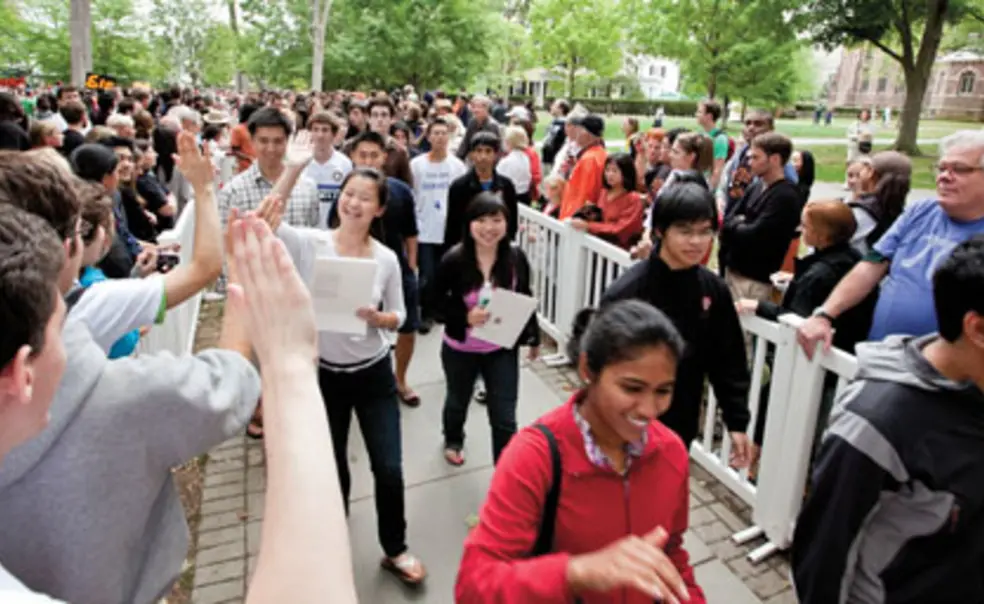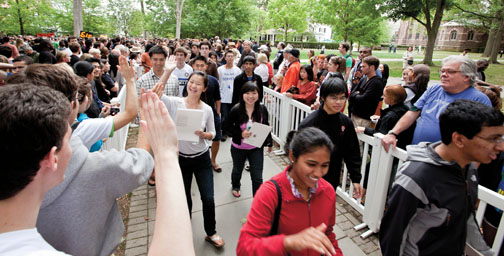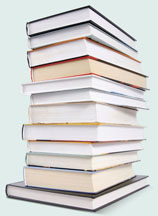The official admission numbers for the Princeton Class of 2014 tell you that there are a record 1,313 freshmen, representing 47 countries and 48 states and with 58.6 percent on financial aid.
Neuroscience professor Sam Wang’s statistics for the Class of 2014 show something very different — how 1,313 freshman brains work.
Wang told the freshman assembly Sept. 12 that he wanted to “hold a mirror up to the class,” and it was a perspective the freshman class hadn’t seen before.
One example: One in six freshmen does not believe in evolution, Wang said, according to a survey completed by class members.
Gaya Morris, a freshman in Mathey College from Hingham, Mass., was skeptical about Wang’s statement that 50 percent of personality comes from an individual’s genetic code; she and other students in her advisee group thought the number sounded arbitrary. But the speech prompted her to think seriously about the development of the brain, she said, and “the various factors that determine who a person is.”
Whether viewed en masse in Wang’s talk, or scrutinized in groups of a dozen or so at advisee meetings, the freshman brain was very much the focal point of orientation week, which ran from move-in Sept. 11 to the start of classes Sept. 16. It was tested by an endless array of names and faces, prodded by professors at departmental open houses, and lauded by President Tilghman in her talk during Opening Exercises.
Tilghman addressed the Class of 2014 on a rainy Sunday afternoon, balancing a celebration of freshman minds with hope for the transformation they might undertake. She talked about the challenge of finding new sources of alternative energy, noting that it would take more than just engineers and scientists to solve the problem.
“The development of new energy sources and protection of the environment are challenges that call out for expertise in everything from moral philosophy to legislative policymaking to behavioral economics,” Tilghman said.
Her speech resonated with Stephen Moch, a freshman in Butler College from Larchmont, N.Y. Moch decided to switch from engineering to economics, saying that the move will let him study environmental economics while leaving space for new classes he wants to take.
“I had always wanted to take Latin,” Moch said. “Instead of taking the Spanish placement test, I signed up for Latin 101.”
For many members of the Class of 2014, the chance to try something new began well before the start of classes. Roughly 60 percent of the class — 796 students — participated in Outdoor Action, the largest pre-orientation backpacking program in the country. This was the largest OA enrollment in the program’s 37-year history; trips varied from rock climbing to working on a sustainable farm.
Mark Watter, a freshman in Mathey College from Havertown, Pa., was one of 125 freshmen who participated in Community Action, working in soup kitchens, building houses, and tending to community gardens. Watter’s group volunteered at an afterschool program in Trenton, organizing a backpack giveaway and a carnival.
Other events focused on service as well. George Will *68, a Pulitzer Prize-winning columnist for The Washington Post, and Joey Cheek ’11, a senior and an Olympic gold medalist speed skater, spoke on civic engagement at an event sponsored by the Pace Center.
Will warned against defining civic service too narrowly. Making money and helping people, he said, are not necessarily mutually exclusive. “Doing a job well in the United States, almost any job, is a form of civic engagement in that it makes the country prosper,” he said. “Creating wealth is a form of helping our country.”
Cheek described how he grew disenchanted with competition — “skating fast in circles,” as he described it — until he realized he could use his celebrity for a greater good. Cheek donated his $25,000 gold-medal bonus in 2006 to the humanitarian organization Right to Play. He also co-founded the group Team Darfur to raise awareness about the genocide in Sudan.
“Find a way to become involved now,” Cheek urged the freshmen. “Not only that, bring a friend.”
When Lelabari Giwa-Ojuri, a freshman in Mathey College from Los Angeles, got back to campus from her Community Action project in Trenton, she decided that getting involved meant joining the women’s rugby team. “I wanted to try something new,” said Giwa-Ojuri, one of 20 bridge-year participants in the class. “I’m really excited for the season.”
THE CLASS OF 2014
Applicants: 26,247*
Students admitted: 2,311
Students enrolled: 1,313*
Yield: 56.8%
AT A GLANCE:
Students on financial aid: 58.6%
Men: 50.4%
Women: 49.6%
U.S. minority students: 37.3%*
Varsity athletic prospects: 16.8%
Sons/daughters of alumni: 13.3%
International students: 10.7%
* Denotes record number.
Source: Office of Admission.
To help gauge what students are paying for course materials, PAW asked Adjani Peralta ’11, Emily Rutherford ’12, Ashley Eberhart ’13, and Laurent Côté ’14 to share their cost of books and other printed materials for the fall term. (In two of Eberhart’s courses, materials are shared electronically at no cost to the students.)
Class Total cost Courses Books/No-charge items
’11 $406.30 5 12 new, 3 used
’12 $317.37 4 9 new, 8 used
’13 $227.01 5 1 new, 12 used/pdfs on Blackboard
’14 $369.71 4 8 new, 1 used














1 Response
Laura Ray ’84
10 Years AgoNot the largest
An Oct. 13 Campus Notebook article states that “roughly 60 percent of the class ... participated in Outdoor Action, the largest pre-orientation backpacking program in the country.”